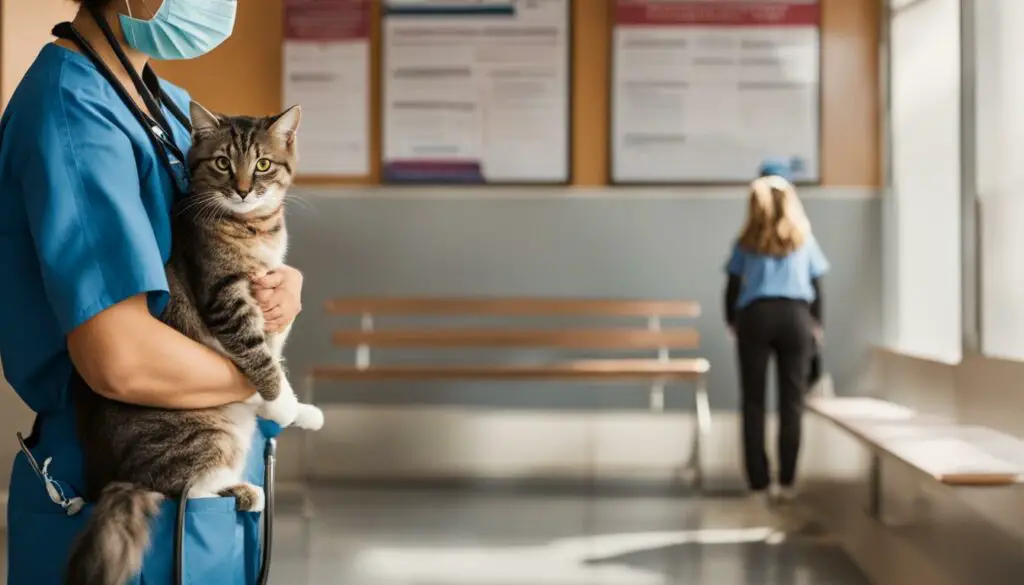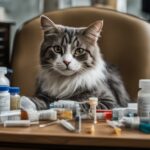As a cat owner, you may be wondering if a veterinarian will see your furry friend without vaccinations. Vaccinations are an essential aspect of feline health, protecting cats from various diseases. However, policies regarding unvaccinated cats can vary among veterinarians. Let’s explore this topic further to understand what options are available for cats without shots.
It’s important to note that while some veterinary clinics may have strict vaccination requirements, others may be more accommodating to unvaccinated cats. Finding a veterinarian who is willing to provide care for your cat, even without vaccinations, is crucial to ensure their overall well-being.
Key Takeaways:
- Not all veterinarians have the same policies regarding unvaccinated cats. It is important to research and find clinics that are willing to provide care for your cat without shots.
- Vaccinations play a crucial role in the health and longevity of cats. They protect against various diseases and help prevent the spread of infections.
- While immediate medical attention may be provided to unvaccinated cats, routine preventive care visits may be limited or unavailable.
- It is recommended to discuss your cat’s vaccination requirements with a veterinarian to determine the appropriate schedule and protect their health.
- Even if your cat is an indoor pet, vaccinations are still important to protect against potential diseases brought into the home and accidental escapes.
Importance of Cat Vaccinations for Vet Visits
Cat vaccinations play a crucial role not only in maintaining the overall health and well-being of our feline companions but also in ensuring access to veterinary care. Many vet clinics have specific requirements when it comes to cat vaccinations before providing their services. This is done to prevent the spread of diseases and create a safe environment for all pets.
By keeping our cats up to date on their vaccinations, we are not only protecting them from potentially life-threatening diseases but also making it easier for them to receive proper medical attention when needed. Vaccinations help reduce the risk of infection and contribute to the overall well-being of our furry friends.
When we prioritize cat vaccinations, we show our commitment to their health, happiness, and longevity. By following recommended vaccination schedules and ensuring our cats are properly immunized, we can give them the best possible chance at a healthy and happy life.
Importance of Cat Vaccinations for Vet Visits
| Vaccination Requirements | Benefits |
|---|---|
| Protection against disease | Prevents the spread of infectious diseases |
| Access to veterinary care | Allows cats to receive necessary medical attention |
| Safe environment for pets | Reduces the risk of infection for other animals |
By understanding the importance of cat vaccinations for vet visits, we can make informed decisions and ensure the well-being of our beloved feline companions. Vaccinations not only protect our cats but also contribute to the overall health and safety of the entire pet community. So let’s prioritize their vaccinations and provide them with the care they deserve.
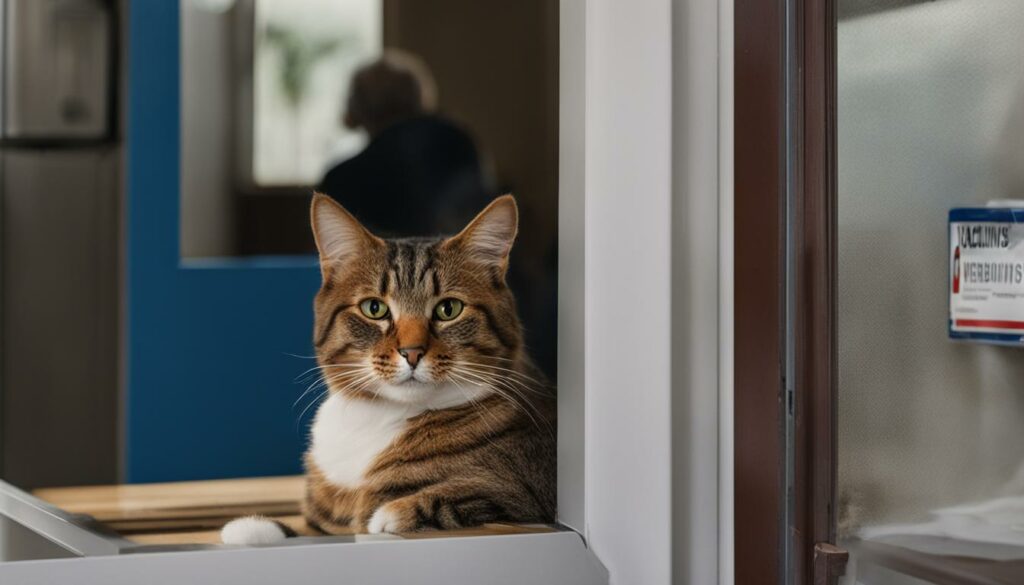
Veterinary Clinics that Accept Cats Without Shots
If you have a cat that hasn’t received vaccinations, it’s important to find a veterinary clinic that is willing to provide the necessary care. While some clinics may have strict policies requiring cats to be up to date on their shots, others may be more accommodating to unvaccinated cats. By researching and finding the right clinic, you can ensure that your cat receives the medical attention it needs.
When searching for a veterinary clinic that accepts cats without shots, it’s helpful to call and inquire about their policies beforehand. Explain your situation and ask if they are willing to treat unvaccinated cats. Some clinics may have specific guidelines or requirements for accepting unvaccinated pets, such as requiring them to be kept separate from other animals in the waiting area.
“Finding a veterinary clinic that accepts cats without shots may require some additional effort, but it is possible to find compassionate and accommodating professionals who are dedicated to providing care for your pet.”
Additionally, it’s important to consider the potential risks involved in taking an unvaccinated cat to a clinic. Unvaccinated cats are more susceptible to contracting and spreading diseases, so it’s crucial to take appropriate precautions to protect your pet and other animals at the clinic. This might include avoiding crowded waiting areas or scheduling appointments during quieter times to minimize the risk of exposure.
Remember, finding a veterinary clinic that accepts cats without shots may require some additional effort, but it is possible to find compassionate and accommodating professionals who are dedicated to providing care for your pet. By doing your research and reaching out to clinics in your area, you can ensure that your unvaccinated cat receives the necessary veterinary care.
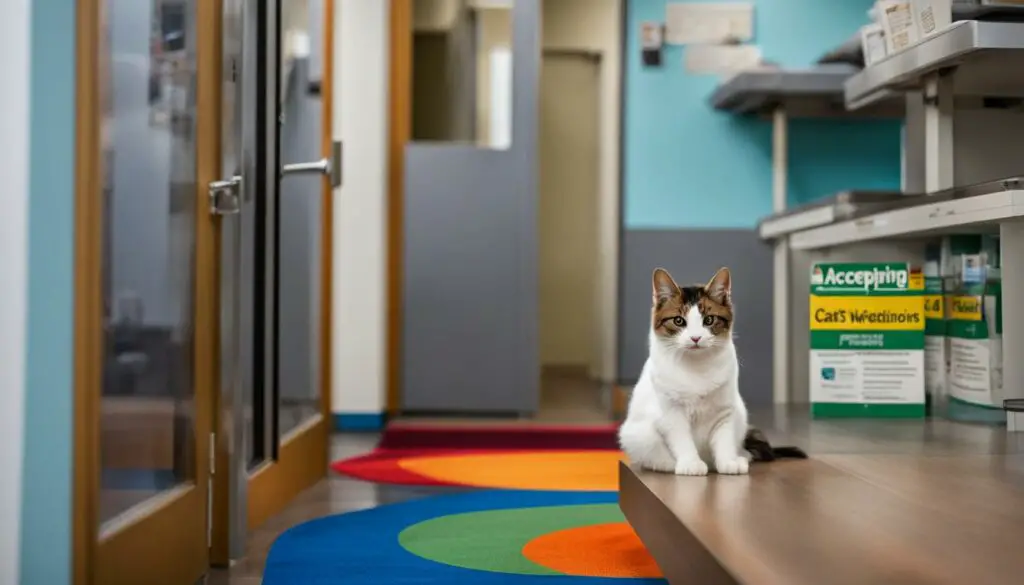
Finding a Vet for Cats Without Vaccination Records
For cat owners without vaccination records, finding a veterinarian who is willing to provide care can be a challenge. However, there are veterinary clinics that understand the importance of providing medical attention to cats that may lack immunizations. It is crucial to seek out these clinics to ensure your cat receives the necessary veterinary care.
When searching for a vet for your cat without vaccination records, it is essential to communicate openly and honestly about your cat’s situation. Provide as much information as possible, including any previous medical history or potential exposure to diseases. This will help the veterinarian assess the level of care your cat needs and develop an appropriate treatment plan.
Some veterinary clinics may require additional precautions for unvaccinated cats, such as scheduling separate appointments or creating a designated area for their examination. These measures are put in place to protect both your cat and other animals in the clinic. By following these guidelines, you can ensure a safe environment for everyone involved.
Veterinary Care for Cats Lacking Immunizations
If you are unable to find a veterinarian who is willing to treat your cat without vaccination records, consider reaching out to local animal shelters or rescue organizations. These organizations often have resources and connections that can help you find a vet who specializes in treating cats in unique situations. Additionally, they may offer low-cost or even free vaccination clinics to assist you in getting your cat up to date on their immunizations.
Remember that the health and well-being of your cat should always be a top priority. By actively seeking veterinary care for your cat without vaccination records, you are taking the necessary steps to ensure their ongoing health and happiness.

| Veterinary Care Checklist |
|---|
| Research veterinary clinics that accept cats without vaccination records |
| Be honest and provide as much information as possible about your cat’s medical history |
| Follow any additional precautions or guidelines set by the vet clinic |
| Consider reaching out to local animal shelters or rescue organizations for assistance |
| Ensure your cat receives the necessary vaccinations to protect their health |
Can a Veterinarian Treat an Unvaccinated Cat?
When it comes to accessing veterinary care for cats without vaccinations, the policies may vary among individual veterinarians. However, in cases where immediate medical attention is required, many veterinarians may be willing to treat unvaccinated cats. It’s important to note that while treatment for urgent situations may be available, preventive care and routine visits may be limited or unavailable for unvaccinated cats.
To ensure the best possible care for your unvaccinated cat, it’s essential to establish a good relationship with a veterinarian who understands your pet’s specific needs and circumstances. Look for a veterinary clinic that is open to working with you to determine the best course of action. They can provide guidance on the necessary medical attention for your cat and help you navigate any potential risks associated with not having vaccinations.
| Veterinary Care for Unvaccinated Cats | Accessing Veterinary Care for Cats Without Vaccinations |
|---|---|
| Immediate medical attention | Establish a good relationship with a veterinarian |
| Preventive care may be limited | Find a veterinary clinic open to working with unvaccinated cats |
| Routine visits may be unavailable | Guidance on necessary medical attention |
Remember, the health and well-being of your cat should always be a top priority. Even if your cat is unvaccinated, it’s crucial to seek medical attention when needed and take appropriate measures to protect their overall health. Consult with a veterinarian to discuss the options available for accessing veterinary care for unvaccinated cats and develop a plan that best suits your pet’s needs.
Understanding Cat Vaccination Requirements
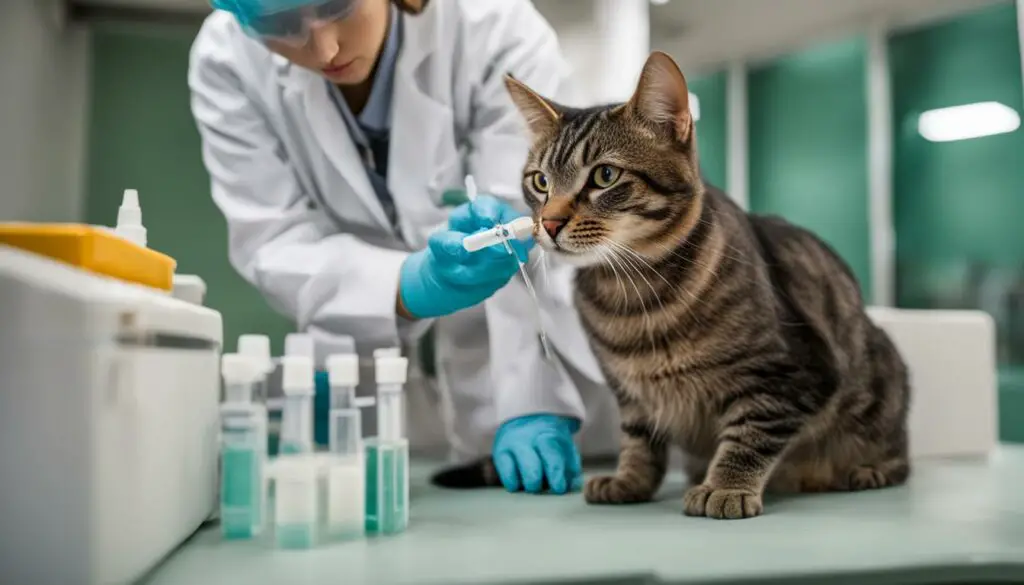
When it comes to cat vaccination requirements at vet clinics, it is important to understand that different states and regions may have specific regulations in place. While some areas legally require the rabies vaccination for cats, there may be variations in the requirements for other vaccinations. However, it is crucial to prioritize your cat’s health and well-being by vaccinating them against common feline diseases, even if not legally obligated.
To ensure your cat receives the necessary protection, it is recommended to discuss vaccination requirements with your veterinarian. They will have the expertise to guide you on the vaccines that are essential for your cat’s specific circumstances. By understanding the local requirements and consulting with your vet, you can make informed decisions about which vaccinations are necessary and meet any legal obligations.
Understanding the Importance of Vaccinations
Vaccinations play a vital role in protecting your cat from preventable diseases. They help stimulate the immune system to produce antibodies that fight off specific pathogens and reduce the likelihood of infection. Vaccinations can prevent serious illnesses and potentially life-threatening conditions, ensuring your furry friend remains healthy and happy.
It is worth noting that even if your cat is primarily indoors, they can still be exposed to diseases through contact with other animals, shared spaces, or even contaminated objects. Vaccinating your cat not only safeguards their health but also helps prevent the spread of diseases to other felines in your community.
Table: Common Cat Vaccinations
| Vaccine | Purpose |
|---|---|
| Rabies | To comply with legal requirements and protect against this fatal disease |
| Panleukopenia | To prevent a highly contagious and life-threatening disease also known as feline distemper |
| Rhinotracheitis | To protect against a viral respiratory infection caused by the feline herpesvirus |
| Calicivirus | To prevent a respiratory infection caused by the calicivirus |
| Feline Leukemia | To safeguard against a contagious and often fatal retrovirus |
It is important to consult with your veterinarian to determine the appropriate vaccination schedule for your cat based on their age, lifestyle, and any underlying health conditions. By adhering to the recommended vaccination requirements, you can provide your feline companion with the best chance of a long, healthy, and happy life.
The Risk Factors for Cats Without Vaccinations
Cats without vaccinations are at a higher risk of contracting and spreading infectious diseases. Without the protection offered by vaccines, these cats are more vulnerable to illnesses such as feline leukemia, panleukopenia, and respiratory infections. It’s important to understand the risk factors associated with unvaccinated cats to take appropriate measures in safeguarding their health.
Several factors contribute to the increased vulnerability of unvaccinated cats. Age plays a significant role, as kittens and older cats have weaker immune systems, making them more susceptible to infections. Cats with preexisting health conditions, such as diabetes or kidney disease, may also be at a higher risk.
Additionally, a cat’s lifestyle can impact its vulnerability to infectious diseases. Outdoor cats, for example, are exposed to a variety of potential disease sources, such as other animals, contaminated food, and environmental factors. Even indoor cats can be at risk if they come into contact with other animals, such as through visits from friends’ pets or contact with strays.
| Risk Factors for Cats Without Vaccinations | Description |
|---|---|
| Age | Kittens and older cats have weaker immune systems, increasing their susceptibility to infections. |
| Preexisting Health Conditions | Cats with underlying health conditions may be more vulnerable to infectious diseases. |
| Lifestyle | Outdoor cats and indoor cats that have contact with other animals are at higher risk. |
To protect unvaccinated cats from potential health hazards, it is crucial to consult with a veterinarian. They can provide guidance on vaccination schedules, preventive measures, and strategies to minimize the risk of disease transmission. Additionally, some veterinary clinics may be more accommodating to unvaccinated cats and offer specific services or precautions to ensure the safety of both the cat and other pets.
By understanding the risk factors and taking appropriate measures, cat owners can help safeguard their pets’ health and well-being, even if they have not received vaccinations.
Recommended Cat Vaccinations
When it comes to protecting the health of our feline companions, vaccinations play a vital role. The American Association of Feline Practitioners (AAFP) recommends a number of vaccinations to safeguard cats against various diseases. These vaccinations are essential for maintaining their well-being and minimizing the risk of infection.
Key Vaccinations
The AAFP recommends several core vaccinations for all cats. These include vaccinations for diseases such as:
- Panleukopenia: This highly contagious viral disease affects a cat’s immune system and can be life-threatening.
- Rhinotracheitis: Caused by the feline herpesvirus, this respiratory infection can lead to severe symptoms and long-term health issues.
- Calicivirus: This viral infection causes respiratory symptoms and can also lead to ulceration of the mouth and other oral problems.
- Rabies: A fatal disease that affects the nervous system, rabies can be transmitted to humans and other animals, making it a serious public health concern.
- Feline Leukemia: This contagious viral infection weakens a cat’s immune system and can lead to cancer and other complications.
These core vaccinations are typically recommended for all cats, regardless of lifestyle or environment. They provide essential protection against common and potentially life-threatening diseases.
Vaccination Schedule
The timing of cat vaccinations is important to ensure optimal protection. Kittens typically start receiving vaccinations at around 6 to 8 weeks of age. The initial vaccination series is then administered in multiple doses, usually at 3 to 4-week intervals, until the kitten is around 16 weeks old.
For adult cats, a yearly booster vaccination is recommended to maintain immune protection. However, the frequency of boosters may vary depending on the cat’s individual circumstances and the specific recommendations of the veterinarian.
Consult with Your Veterinarian
While these core vaccinations are generally recommended, it’s important to consult with your veterinarian to determine the most appropriate vaccination plan for your cat. Your vet will consider factors such as your cat’s age, lifestyle, and overall health to develop a personalized vaccination schedule.
By following the recommended vaccination guidelines and working closely with your veterinarian, you can ensure that your cat receives the necessary protection against preventable diseases and enjoys a long, healthy life.

Kitten and Cat Vaccination Schedules
When it comes to the vaccination schedules for kittens and cats, there are various factors to consider. Age, preexisting medical conditions, and living situations are all important considerations when determining the appropriate vaccination schedule for your cat. It is crucial to consult with a veterinarian to ensure your cat receives the necessary vaccinations at the right time.
For kittens, vaccinations typically begin around 6-8 weeks of age. The specific vaccines administered will depend on the veterinarian’s recommendations and the prevalence of certain diseases in your area. Common vaccinations for kittens include those for panleukopenia, rhinotracheitis, and calicivirus.
As kittens grow older, they will receive additional booster vaccinations to ensure they develop a strong immune response. The vaccination series is typically completed by 16 weeks of age. It is essential to adhere to the recommended schedule to provide optimal protection for your kitten.
Once a cat reaches adulthood, vaccinations are generally administered on an annual basis or as recommended by the veterinarian. Vaccinations for diseases such as rabies and feline leukemia may be included in the adult cat vaccination schedule. However, it’s important to keep in mind that the specific vaccines required can vary based on factors such as your cat’s lifestyle and the prevalence of certain diseases in your area.
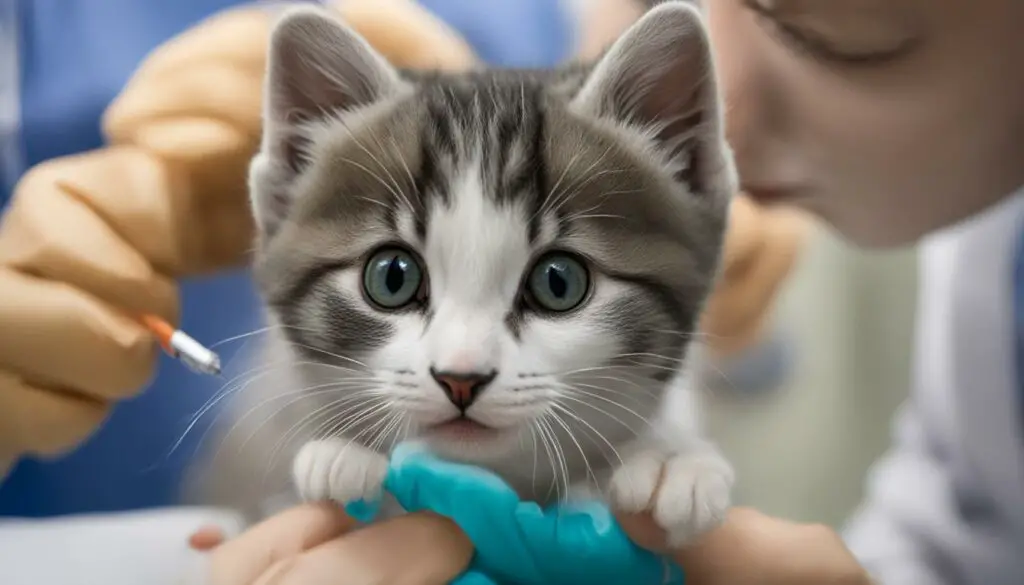
Table: Recommended Vaccination Schedule for Kittens
| Age | Vaccinations |
|---|---|
| 6-8 weeks | FVRCP (panleukopenia, rhinotracheitis, calicivirus) |
| 10-12 weeks | FVRCP booster |
| 14-16 weeks | FVRCP booster |
Table: Recommended Vaccination Schedule for Adult Cats
| Age | Vaccinations |
|---|---|
| 1 year | FVRCP booster, rabies |
| Annually or as recommended | FVRCP booster, rabies, feline leukemia (if necessary) |
Risks Associated With Cat Vaccinations
While cat vaccinations are generally safe and highly recommended for the health of your feline companion, it is important to be aware of potential risks associated with these vaccinations. Understanding these risks can help you make informed decisions and ensure the well-being of your cat.
Common mild side effects of cat vaccinations include soreness at the injection site, mild fever, and temporary lethargy. These symptoms typically subside within a few days and are not cause for major concern. However, in rare cases, allergic reactions may occur. Signs of an allergic reaction can include difficulty breathing, excessive swelling, hives, or vomiting. If you notice any of these severe symptoms, it is important to seek immediate veterinary attention.
Although serious complications from cat vaccinations are extremely rare, it is essential to discuss your cat’s health history and any preexisting conditions with your veterinarian. Certain health conditions or medications may increase the risks associated with vaccinations. Your veterinarian can help assess these risks and determine the most appropriate vaccination plan for your cat.
Despite the potential risks, it is important to remember that the benefits of cat vaccinations far outweigh the minimal chance of complications. Vaccinations help protect your cat from serious and potentially life-threatening diseases, ensuring their overall health and longevity. By discussing any concerns or questions with your veterinarian, you can make informed decisions and provide your cat with the necessary protection against harmful diseases.
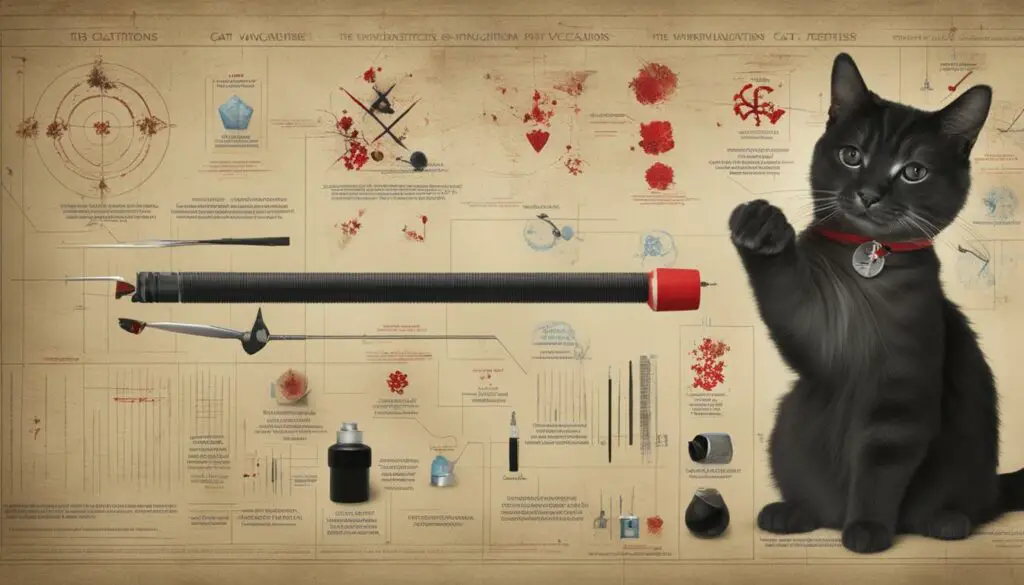
Evaluating Vaccination Risks and Benefits
When considering the risks associated with cat vaccinations, it is essential to weigh them against the potential benefits. Vaccinations play a crucial role in preventing the spread of infectious diseases and protecting not only your cat but also other pets in your community. By ensuring your cat is up to date on vaccinations, you can help create a safer environment for all animals.
Additionally, many veterinary clinics require cats to be vaccinated before providing services. This policy helps minimize the risk of disease transmission within the clinic and ensures a safer experience for all pets. By keeping your cat’s vaccinations current, you can easily access veterinary care whenever it is needed.
Ultimately, the decision to vaccinate your cat should be based on a comprehensive understanding of the risks and benefits, taking into account your cat’s individual health situation and lifestyle. By working closely with your veterinarian, you can develop a vaccination plan that best meets the needs of your cat and provides the necessary protection against preventable diseases.
Side Effects to Watch for After Cat Vaccination
After receiving vaccinations, most cats will not experience any significant side effects. However, it is important to monitor your cat for any unusual symptoms that may indicate a reaction to the vaccination. While serious complications are rare, it is always better to be cautious and ensure your cat’s well-being. Here are some side effects to watch for:
- Fever: A mild increase in body temperature is normal after vaccination. However, if your cat has a high fever or a fever that lasts more than a day, it is essential to seek veterinary attention.
- Lethargy: Some cats may appear more tired or sluggish than usual after vaccination. This is usually temporary and should resolve within a day or two. If your cat seems excessively lethargic or is unresponsive, consult a veterinarian.
- Loss of appetite: It is not uncommon for cats to have a decreased appetite for a short time after vaccination. However, if your cat refuses to eat for more than 24 hours or shows signs of severe dehydration, it is important to seek veterinary care.
- Vomiting and diarrhea: Mild gastrointestinal upset, including occasional vomiting or diarrhea, can occur after vaccination. If these symptoms persist or worsen, consult a veterinarian.
- Swelling and redness at the injection site: It is normal for the injection site to be slightly swollen and tender immediately after vaccination. However, if the swelling continues to increase or is accompanied by severe redness, pus, or discharge, seek veterinary attention.
- Lameness: In some cases, cats may experience temporary lameness or stiffness after receiving certain vaccinations. If your cat is unable to walk or appears to be in significant pain, consult a veterinarian.
- Hives: Allergic reactions to vaccines can manifest as hives, which are raised, itchy bumps on the skin. If your cat develops hives or any signs of an allergic reaction, seek immediate veterinary care.
Remember, these side effects are typically mild and temporary. However, it is always important to trust your instincts and seek veterinary attention if you are concerned about your cat’s well-being. Your veterinarian will be able to assess the situation and provide appropriate guidance and treatment if necessary.
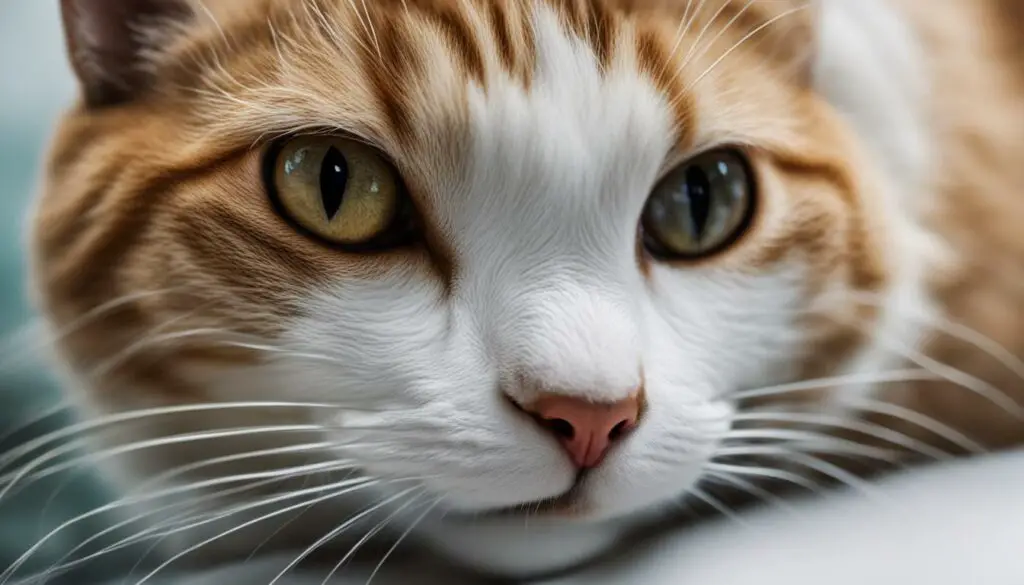
Table: Common Side Effects of Cat Vaccinations
| Vaccine | Common Side Effects |
|---|---|
| Panleukopenia | Fever, lethargy, loss of appetite |
| Rhinotracheitis, Calicivirus | Sneezing, nasal discharge, conjunctivitis |
| Rabies | Behavioral changes, fever, swelling at injection site |
| Feline Leukemia | Lethargy, anemia, fever |
When to Schedule Kitten and Cat Vaccinations
As a responsible pet owner, it is crucial to understand when to schedule kitten and cat vaccinations to ensure the ongoing health and well-being of your feline companion. Vaccinations play a vital role in protecting cats against various diseases and preventing the spread of infectious illnesses. By adhering to a vaccination schedule, you can provide your cat with the necessary immunizations to keep them safe and healthy.
For kittens, it is recommended to start their vaccination series as soon as you bring them home. Kittens are particularly vulnerable to diseases, and vaccinations are essential in building their immunity. The initial series typically includes vaccinations against diseases such as panleukopenia, rhinotracheitis, and calicivirus. These core vaccines are usually administered when kittens are around 6-8 weeks old, with booster shots given every 3-4 weeks until they are around 16 weeks old.
Once your kitten has completed the initial vaccination series, it is important to follow up with annual vaccinations for adult cats. These booster shots help maintain your cat’s immunity and protect against diseases such as rabies and feline leukemia. The one-year mark after completing the kitten vaccine series is typically when adult cats receive their first round of booster shots. However, it’s important to consult with your veterinarian to customize the vaccination schedule based on your cat’s specific needs.
| Vaccine | Recommended Age to Start | Booster Shots |
|---|---|---|
| Panleukopenia, Rhinotracheitis, Calicivirus | 6-8 weeks | Booster shots every 3-4 weeks until 16 weeks old |
| Rabies | 1 year | Yearly boosters |
| Feline Leukemia | 1 year | Yearly boosters |
By following a recommended vaccination schedule, you can ensure that your cat receives the necessary immunizations at the appropriate times. This helps protect them from common feline diseases, reduces the risk of transmission to other pets, and ensures a healthier life for your furry friend. Remember to consult with your veterinarian for guidance on the best vaccination plan for your cat, taking into consideration their age, health status, and lifestyle.
Importance of Vaccinating Indoor Cats
While it may be tempting to assume that indoor cats are safe from diseases, it is crucial to remember that they can still be exposed to potential health risks. Vaccinating indoor cats plays a vital role in protecting their overall health and well-being, even if they do not have regular outdoor access.
Contaminants can easily be brought into the home on shoes and clothing, introducing potential diseases to your indoor cat. Additionally, there is always a risk of accidental escape, especially when doors are left open or visitors come and go. Vaccinations provide a layer of protection against common feline diseases and ensure that even if your cat manages to get outside, they are safeguarded against potential infections.
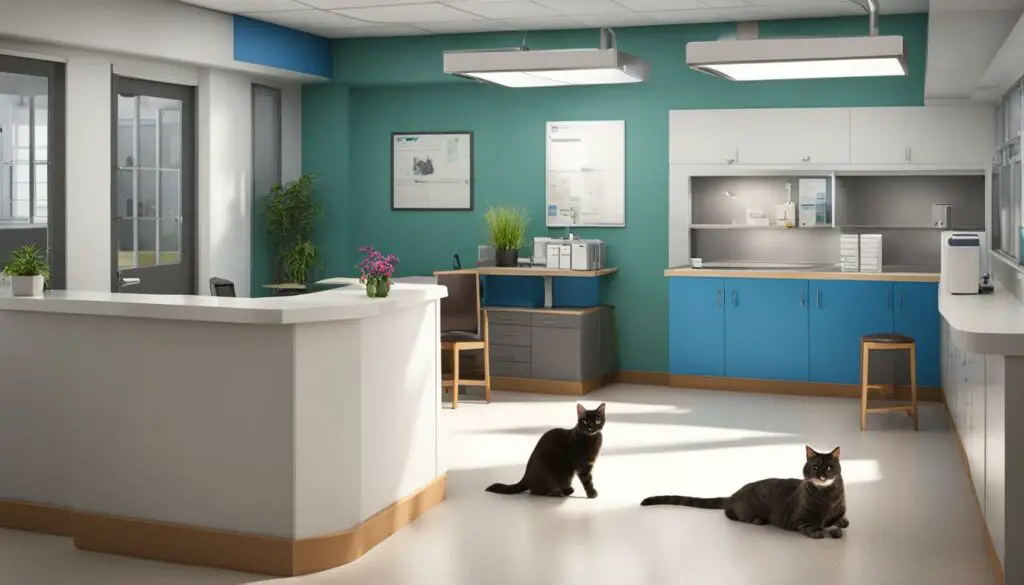
Risk of Disease Transmission
Indoor cats may still be at risk of exposure to various diseases, as humans can inadvertently bring pathogens into the home. For example, visitors who have been in contact with other cats may unknowingly transfer infectious agents on their hands or clothing. Vaccinations help reduce the risk of disease transmission by providing the necessary antibodies to combat common feline illnesses.
“Vaccinating indoor cats protects them from potential diseases brought into the home and ensures their overall health and well-being.”
Protecting Community Cats
Vaccinating indoor cats not only safeguards their individual health but also contributes to the well-being of the larger feline community. Cats are social animals, and accidental escapes can lead to encounters with community cats or strays that may carry diseases. By ensuring your indoor cat is vaccinated, you are helping prevent the spread of infectious diseases among the feline population.
Consult a Veterinarian
When it comes to cat vaccinations, it is essential to work closely with a veterinarian to determine the appropriate vaccines for your indoor cat. Your veterinarian can assess the specific risks based on your cat’s lifestyle, location, and potential exposure to other animals. They will help develop a vaccination plan tailored to your cat’s needs, ensuring they receive the necessary protection against common feline diseases.
Conclusion
Vaccinations play a crucial role in the health and well-being of cats. By prioritizing your cat’s vaccinations, you can ensure they receive the necessary medical care and protection against diseases. While the policies regarding unvaccinated cats may vary among veterinarians and clinics, it is important to consult with a veterinarian to develop a vaccination plan that meets your cat’s specific needs.
Regular vaccinations not only safeguard your cat’s health, but they also help prevent the spread of diseases to other pets. Vaccinated cats are less likely to contract and transmit infectious diseases, creating a safer environment for all pets in your household and community.
When it comes to your cat’s vaccinations, it’s essential to stay up to date with recommended schedules and ensure they receive all necessary immunizations. By doing so, you are taking proactive steps to protect your cat’s well-being and providing them with the best chance at a long and healthy life. Remember, the advice and guidance of a veterinarian are invaluable in determining the most suitable vaccination plan for your cat, so don’t hesitate to reach out to them with any questions or concerns.
Take the time to prioritize your cat’s vaccinations and give them the gift of protection. Together, we can create a healthier and happier environment for our feline companions.
FAQ
Will a Vet See a Cat Without Shots?
It depends on the policies of individual veterinarians. While some veterinary clinics may have strict vaccination requirements, others may be more accommodating to unvaccinated cats. It is important to research and find veterinary clinics that are willing to provide care for cats without shots.
What are the Importance of Cat Vaccinations for Vet Visits?
Cat vaccinations are not only important for the overall health of the cat but also play a role in accessing veterinary care. Many veterinary clinics require cats to be up to date on their vaccinations before providing services, as it helps prevent the spread of diseases and ensures a safe environment for all pets.
Are there Veterinary Clinics that Accept Cats Without Shots?
Yes, there are veterinary clinics that may be able to work with you to determine the best course of action and ensure your cat receives the necessary medical attention, even if they are unvaccinated. It is essential to research and find these clinics to ensure your pet receives the care they need.
How can I Find a Vet for Cats Without Vaccination Records?
If your cat does not have vaccination records, it may be challenging to find a veterinarian who is willing to provide care. However, there are veterinary clinics that may be able to work with you to determine the best course of action and ensure your cat receives the necessary medical attention.
Can a Veterinarian Treat an Unvaccinated Cat?
While it ultimately depends on the policies of individual veterinarians, many may be willing to treat unvaccinated cats, especially in cases where immediate medical attention is required. However, it is important to note that preventive care and routine visits may be limited or unavailable for unvaccinated cats.
What are the Cat Vaccination Requirements?
Different states and regions may have specific cat vaccination requirements, with rabies being the only vaccination legally required in some areas. However, it is still important to vaccinate cats against other diseases to protect their health and well-being.
What are the Risk Factors for Cats Without Vaccinations?
Cats without vaccinations are at a higher risk of contracting and spreading infectious diseases. Factors such as age, overall health, and lifestyle can further impact their vulnerability to these diseases. It is crucial to consider these risk factors and take appropriate measures to protect your cat.
What are the Recommended Cat Vaccinations?
The American Association of Feline Practitioners recommends certain cat vaccinations, including those for diseases such as panleukopenia, rhinotracheitis, calicivirus, rabies, and feline leukemia. These vaccinations help prevent the spread of these diseases and protect the health of cats.
What is the Kitten and Cat Vaccination Schedule?
The vaccination schedules for kittens and cats vary based on factors such as age, preexisting medical conditions, and indoor or outdoor living situations. It is important to discuss these factors with a veterinarian to determine the appropriate vaccination schedule for your cat.
What are the Risks Associated With Cat Vaccinations?
While cat vaccinations are generally safe, there can be some risks associated with them. These risks include mild symptoms such as soreness at the injection site, fever, and allergic reactions. However, serious complications are rare, and the benefits of vaccinations outweigh the potential risks.
What Side Effects Should I Watch for After Cat Vaccination?
Most cats will not experience any significant side effects after receiving vaccinations. However, it is important to monitor for symptoms such as fever, severe lethargy, loss of appetite, vomiting, diarrhea, swelling and redness around the injection site, lameness, and hives. If these symptoms occur, it is crucial to seek veterinary attention.
When Should I Schedule Kitten and Cat Vaccinations?
It is recommended to schedule kitten vaccinations as soon as you bring your new kitten home. Adult cat vaccinations are typically scheduled one year after the completion of the kitten vaccination series. Adhering to a vaccination schedule helps ensure the ongoing health and well-being of your cat.
Why is it Important to Vaccinate Indoor Cats?
Even if your cat is an indoor-only pet, it is still important to vaccinate them. Contaminants can be brought into the home on shoes and clothes, and there is always a risk of accidental escape. Vaccinations help protect indoor cats from potential diseases and ensure their overall health.

